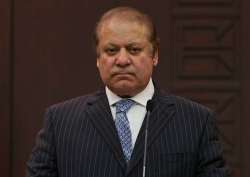Nawaz Sharif today resigned as Pakistan Prime Minister after the Supreme Court disqualified him from holding public office and ruled that graft cases be filed against the beleaguered leader and his children over the Panama Papers scandal. It is the third time the 67-year-old veteran politician's term as premier has been cut short. The much-awaited verdict plunged Pakistan into a political crisis at a time when the country is facing a brittle economy and a surge in militancy.
Following is the chronology of the Panamagate scandal:
April 4, 2016: The International Consortium of Investigative Journalism publishes the Panama Papers, exposing tax evasion by the world's elite through off-shore accounts and shell companies. The documents include names of Sharif's family.
April 5, 2016: Sharif sets up a judicial committee to investigate the allegations, denies charges.
April 26, 2016: Opposition parties reject the judicial commission set up by the government.
November 1, 2016: The Supreme Court decides to pursue a case related to Nawaz Sharif.
November 7, 2016: PML-N submits Qatari prince's letter to the Supreme Court containing information about the London flats that were at the centre of the Panama Papers scandal.
January 6, 2017: Sharif's daughter Maryam Nawaz submits details of assets after the Supreme Court resumes hearing.
April 20, 2017: SC orders formation of a JIT with a split 3-2 verdict to probe the corruption charges against Sharif.
May 5, 2017: SC formally constitutes the JIT.
May 22, 2017: The JIT presents its first bi-weekly report to the SC in two volumes.
May 24, 2017: The JIT sends questionnaires to Sharif and his two sons - Hussain and Hassan.
May 28, 2017: Sharif's elder son, Hussain, appears before the JIT, claims it did not provide him any questionnaire.
May 30, 2017: Hussain appears before JIT for the second time.
June 13, 2017: The JIT submits report to the SC on obstructions to its work, blames government institutions for "creating impediments in the collection of evidence".
June 15, 2017: Sharif appears before the JIT for questioning, becoming the first sitting Pakistan prime minister to appear before any investigating agency.
June 17, 2017: Sharif's younger brother and Chief Minister of Punjab Shahbaz Sharif questioned by JIT.
July 5, 2017: Sharif's daughter Maryam appears before JIT.
July 7, 2017: Former Qatari premier Sheikh Hamad bin Jassim bin Jaber Al-Thani sends a letter to the JIT, asking it to record his statement at his palace before submitting its final report to the SC.
July 8, 2017: PML-N says will reject any JIT report without Qatari ex-premier's statement.
July 10, 2017: The JIT submits final report to the SC.
July 21, 2017: The three-judge bench Supreme Court bench hearing the case reserves decision.
July 28, 2017: The five-member SC bench unanimously rules against Sharif, disqualifying him from the office.
Latest World News

